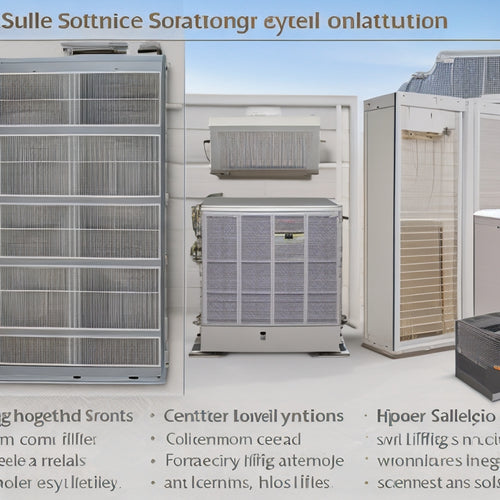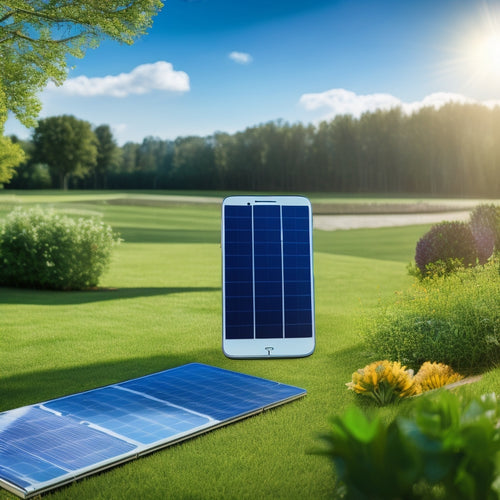7 Eco-Friendly Tips for Recycling EV Power Sources
Share
When recycling EV power sources, you'll want to explore refurbished solar panels, repurpose EV battery materials, and adopt sustainable disposal methods. You can even turn trash into new tech, like upcycled gadgets or reborn robots. Closed-loop recycling systems and designing for deconstruction can also minimize waste. To take it further, you can embrace green recycling technologies, like urban mining strategies to extract metals from spent batteries. By implementing these eco-friendly tips, you'll reduce environmental impacts and conserve resources. As you explore these innovative approaches, you'll discover even more opportunities to transform the recycling landscape.
Key Takeaways
• Embrace sustainable disposal methods by prioritizing reduction, reuse, and recycling to minimize environmental impacts.
• Adopt closed-loop recycling systems to reclaim and reprocess valuable materials from spent batteries.
• Design EV power sources for efficient disassembly and recycling, incorporating modular architecture and recyclable materials.
• Utilize green recycling technologies to process and recover valuable materials efficiently, minimizing environmental footprint.
• Repurpose retired EV battery materials for innovative technologies, such as upcycled gadgets and reborn robots for search and rescue missions.
Recycling Old Solar Panels
As the solar industry continues to grow, you'll inevitably need to dispose of old or damaged solar panels, and recycling them is essential to minimize their environmental footprint.
When it's time to replace your solar panels, you can't simply throw them away. Instead, consider Solar Panel Refurbishment, which involves repairing and reusing functional panels. This not only reduces waste but also helps to conserve resources.
Before recycling, conduct an Environmental Impact Assessment to identify the most impactful recycling methods. This assessment will help you determine the best approach for recycling your old solar panels, ensuring they're disposed of in a way that minimizes harm to the environment.
Repurposing EV Battery Materials
You can breathe new life into retired EV batteries by repurposing their valuable materials, reducing the demand for primary production and the environmental burdens that come with it.
Through material harvesting, you can extract valuable components like lithium, nickel, and cobalt, which can be reused in new battery production or other applications. This not only reduces waste but also helps conserve natural resources.
Additionally, you can get creative with battery artistry, transforming old batteries into unique decorative pieces or functional items like planters or lamp bases.
Sustainable Disposal Methods
By embracing sustainable disposal methods, you can guarantee that retired EV batteries are managed in an environmentally responsible manner, minimizing their potential harm to the ecosystem. An important aspect of sustainable disposal is adhering to the waste hierarchy, which prioritizes reduction, reuse, and recycling over disposal. When landfill disposal is unavoidable, responsible landfills that employ advanced technologies to minimize environmental impacts should be utilized.
| Disposal Method | Environmental Impact | Cost-Effectiveness |
| Recycling | Low | High |
| Responsible Landfills | Medium | Medium |
| Incineration | High | Low |
Turning Trash Into New Tech
In the ever-evolving landscape of EV power source recycling, researchers are now repurposing retired battery materials to develop innovative technologies. You're probably wondering what kind of tech can be created from discarded EV batteries. The possibilities are vast, and it's exciting to see what's being developed.
Here are some examples of upcycled gadgets and tech archaeology in action:
-
Reborn robots: Old battery cells are being reused to power robots designed for search and rescue missions.
-
Solar-powered sensors: Retired EV batteries are being repurposed to store energy harvested from solar panels, powering sensors for environmental monitoring.
-
E-bikes from scratch: Researchers are transforming old EV batteries into e-bike batteries, reducing waste and promoting sustainable transportation.
- Energy-harvesting wearables: Scientists are developing wearable devices that harness kinetic energy from human movement, thanks to upcycled EV battery tech.
Closed-Loop Recycling Systems
Closed-loop recycling systems are emerging as an essential component in the sustainable management of EV power sources, allowing manufacturers to reclaim and reprocess valuable materials from spent batteries. By designing a closed-loop system, you can optimize material flowcharts and reduce waste. This approach enables the continuous recycling of materials, minimizing the need for primary resource extraction.
| Material | Collection | Recycling Rate |
|---|---|---|
| Lithium | 80% | 50% |
| Cobalt | 70% | 40% |
| Nickel | 90% | 60% |
| Graphite | 60% | 30% |
Designing for Deconstruction
You can greatly reduce the environmental impact of EV power sources by designing them for deconstruction, allowing for efficient disassembly and recycling of components. This approach enables the reuse and recycling of valuable materials, minimizing waste and the demand for raw materials.
By incorporating modular architecture, you can create power sources with easily removable components, making it simpler to recover and recycle materials. Additionally, implementing material passports can help track the origin, composition, and recyclability of materials, facilitating the recycling process.
- Design power sources with modular architecture to enable easy disassembly
- Implement material passports to track material composition and recyclability
- Use standardised connections and interfaces for easy component removal
- Consider using recyclable materials and minimizing material diversity
Green Recycling Technologies
By adopting green recycling technologies, you can further minimize the environmental footprint of EV power sources by efficiently processing and recovering valuable materials from spent components.
One such approach is urban mining strategies, which involve extracting valuable materials like lithium, cobalt, and nickel from spent EV batteries. This closed-loop approach reduces the demand for primary materials, decreasing the environmental impact of mining.
Additionally, bio-based innovations can be used to develop sustainable recycling processes. For instance, microorganisms can be used to extract metals from spent batteries, reducing the need for harsh chemicals.
Frequently Asked Questions
Can I Recycle My Ev's 12V Auxiliary Battery Too?
Yes, you can recycle your EV's 12V auxiliary battery too! To optimize battery life, monitor your charging habits, avoid deep discharging, and keep it away from extreme temperatures to guarantee a longer lifespan and efficient recycling.
Are There Any Federal Incentives for Recycling EV Batteries?
"Ha! You thought recycling your EV battery was a hassle? Guess what, you might get paid for it! You're eligible for federal Tax Credit Benefits and State Rebate Programs, so go ahead, recycle and reap the rewards!"
Can I Reuse Old EV Battery Cells for DIY Projects?
You can repurpose old EV battery cells for DIY projects, but make sure cell refurbishment is done safely and efficiently, then explore energy harvesting applications, like powering small devices or charging stations, with caution.
How Do I Safely Dispose of a Damaged EV Battery?
'When you're stuck between a rock and a hard place, safely disposing of a damaged EV battery is vital. You must handle it with care, as battery dangers and environmental hazards lurk around the corner, awaiting mishandling.'
Are There Any Standardized EV Battery Recycling Protocols?
You'll be relieved to know that yes, industry standards and a regulatory framework for EV battery recycling are emerging, with organizations like the Responsible Minerals Initiative and the Institute of Scrap Recycling Industries setting guidelines.
Related Posts
-

Why Solar HVAC Filters Revolutionize Home Energy Efficiency
By adopting solar HVAC filters, you're shifting your home's energy reliance from fossil fuels to clean, renewable sou...
-

3 Earth-Loving Furniture Tips for Energy-Smart Homes
When furnishing your energy-smart home, you have the power to reduce your carbon footprint greatly by making consciou...
-

7 Best Solar Panel Upkeep Apps for Homeowners
You can optimize your solar panel's energy output and efficiency by up to 20% with regular maintenance, which is wher...


